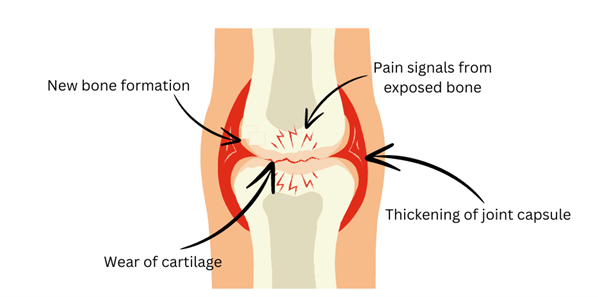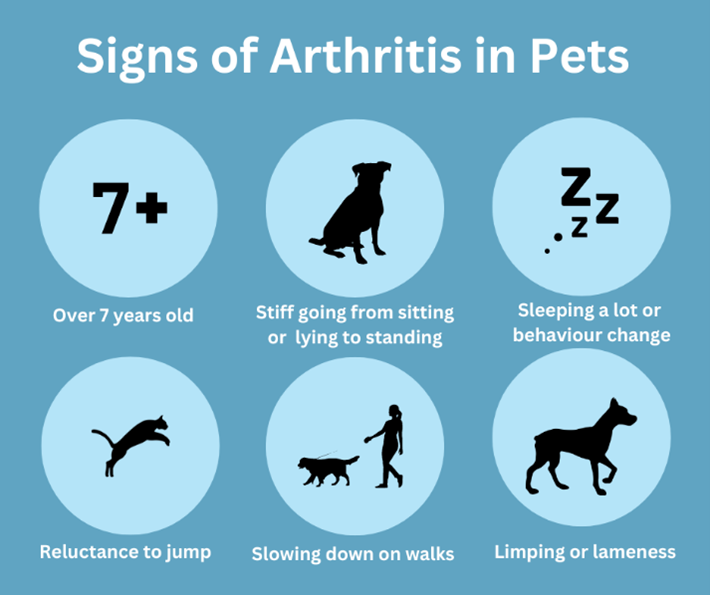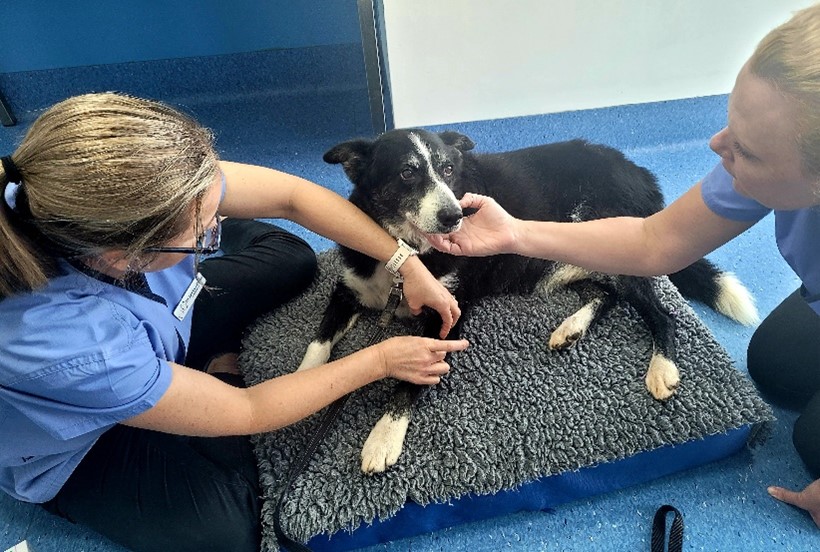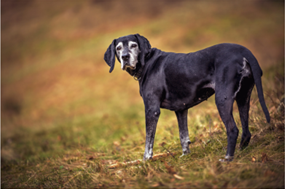 As the weather gets colder, we often find our senior patients getting stiffer and more sore with osteoarthritis. Osteoarthritis (used interchangeably with arthritis or OA) occurs when there is wear or damage in a joint that causes inflammation and pain. It is a chronic condition meaning it can’t be cured, however we can manage it very effectively with pain relief, supportive therapies and lifestyle changes that we will discuss in more detail later in the blog. It is a really common condition, affecting around 80% of dogs over 8 years old. Young dogs can also develop arthritis, especially if there is an underlying conformational problem such as elbow or hip dysplasia. Older cats are commonly affected but often go undiagnosed because they are so good at hiding signs of pain.
As the weather gets colder, we often find our senior patients getting stiffer and more sore with osteoarthritis. Osteoarthritis (used interchangeably with arthritis or OA) occurs when there is wear or damage in a joint that causes inflammation and pain. It is a chronic condition meaning it can’t be cured, however we can manage it very effectively with pain relief, supportive therapies and lifestyle changes that we will discuss in more detail later in the blog. It is a really common condition, affecting around 80% of dogs over 8 years old. Young dogs can also develop arthritis, especially if there is an underlying conformational problem such as elbow or hip dysplasia. Older cats are commonly affected but often go undiagnosed because they are so good at hiding signs of pain.
What happens in an arthritic joint?
When a joint becomes arthritic there are several processes that happen. The cartilage is worn down, exposing bone and nerve endings in the bone which causes pain. The joint capsule can also become thickened and inflamed and the joint fluid becomes thinner, reducing the lubrication within the joint. Due to pain, the animal doesn’t bear as much weight on the affected leg, causing muscle loss and weakening of the supportive ligaments. This leads to overall instability of the joint. In response to the instability and inflammation, the body forms new bone around the joint which changes the way the joint can bear weight and absorb shock as the animal moves.
What symptoms do we see?
In extreme cases we see limping and lameness in affected animals, however many pets show more subtle symptoms earlier in the disease process. They might be slow or stiff getting up from a sitting or standing position, be slower on walks or not want to walk as far, be reluctant to jump up or down from furniture or to go up and down stairs. Cats might show even more subtle signs such as being very sedentary, not wanting to engage in play or not wanting to be stroked or brushed due to arthritis in the spine or hips. We also often see behavioural changes such as an increase in anxiety or even becoming a bit nippy and intolerant in some patients.
How do we diagnose it?
In many animals, we can make a diagnosis from a thorough clinical exam in a consultation. During June, we are offering free senior health checks to assess for arthritis if you have noticed any signs of arthritis in your pet. In more complex cases where we are concerned there might also be cruciate ligament damage or an underlying cause such as hip or elbow dysplasia, we might also recommend x-rays.
How do we treat it?
 Unfortunately, there is no cure for arthritis, but we have some very effective therapies available to slow progression of the disease processes and prevent pain. The biggest aim of treatment is pain management for which we make a personalised plan for each patient based on their pain levels, other concurrent diseases and ability to take medication. This might include monthly injections such as Pentosan or Beransa, anti-inflammatory pain killers and joint supplements.
Unfortunately, there is no cure for arthritis, but we have some very effective therapies available to slow progression of the disease processes and prevent pain. The biggest aim of treatment is pain management for which we make a personalised plan for each patient based on their pain levels, other concurrent diseases and ability to take medication. This might include monthly injections such as Pentosan or Beransa, anti-inflammatory pain killers and joint supplements.
Weight management is vital to helping arthritic patients. This can be really challenging if your pet is sore and doesn’t want to exercise much so having a pain relief plan in place, as well as a specific diet recommendation, will set your pet up for success.
Supportive therapies such as acupuncture can also be really helpful to manage pain. Dr Jen has helped many arthritic patients with acupuncture- for more information you can read about it in her previous blog.
Lifestyle changes can also help pets with arthritis. Modifying your dog’s exercise routine can help reduce pain and keep muscle strength- this can include:
- Keeping walks short but frequent
- Avoiding steep or unstable terrain
- Avoiding high impact exercise such as chasing the ball and jumping. Stick to gentle walking
- Including non-weight bearing exercise such as swimming
Providing steps or ramps off furniture and additional grip to flooring with rugs and runners can also help with overall ability to get around.
We really notice our older pets struggling at this time of the year and help is readily available. Give us a ring on 07 3353 6999 to book your free arthritis assessment for them, we would love to help.




